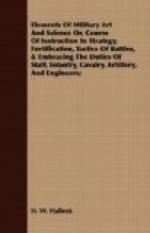But it has been said that the use of the sword is either directly or typically forbidden to the Christian, by such passages as “Thou shalt not kill,” (Deut. v. 17,) “I say unto you, that ye resist not evil: but whosoever shall smite thee on thy right cheek, turn to him the other also,” (Matt. v. 39,) &c. If these passages are to be taken as literal commands, as fanatics and religious enthusiasts would have us believe, not only is war unlawful, but also all our penal statutes, the magistracy, and all the institutions of the state for the defence of individual rights, the protection of the innocent, and the punishment of the guilty. But if taken in conjunction with the whole Bible, we must infer that they are hyperbolical expressions, used to impress strongly on our minds the general principle of love and forgiveness, and that, so far as possible, we over come evil with good. Can any sober-minded man suppose, for a moment, that we are commanded to encourage the attacks of the wicked, by literally turning the left cheek when assaulted on the right, and thus induce the assailant to commit more wrong? Shall we invite the thief and the robber to persevere in his depredations, by literally giving him a cloak when he takes our coat; and the insolent and the oppressor to proceed in his path of crime, by going two miles with him if he bid us to go one?
Again, if the command, “Thou shalt not kill,” is to be taken literally, it not only prohibits us from engaging in just war, and forbids the taking of human life by the state, as a punishment for crime; it also forbids, says Dr. Leiber, our taking the life of any animal, and even extends to the vegetable kingdom,—for undoubtedly plants have life, and are liable to violent death—to be killed. But Dr. Wayland concedes to individuals the right to take vegetable and animal life, and to society the right to punish murder by death. This passage undoubtedly means, thou shalt not unjustly kill,—thou shalt do no murder; and so it is rendered in our prayer-books. It cannot have reference to war, for on almost the next page we find the Israelites commanded to go forth and smite the heathen nations,—to cast them out of the land,—to utterly destroy them,—to show them no mercy, &c. If these passages of the Bible are to be taken literally, there is no book which contains so many contradictions; but if taken in connection with the spirit of other passages, we shall find that we are permitted to use force in preventing or punishing crime, whether in nations or in individuals; but that we should combine love with justice, and free our hearts from all evil motives.
II. All wars are unjustifiable, because “God commands us to love every man, alien or citizen, Samaritan or Jew, as ourselves; and the act neither of society nor of government can render it our duty to violate this command.”




